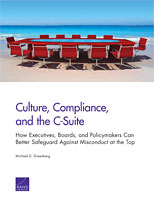Culture, Compliance and the C-Suite: The RAND Symposium
 On May 2, 2013, I participated in a RAND Corporation symposium along with several distinguished participants concerning corporate culture and compliance in the C-Suite.
On May 2, 2013, I participated in a RAND Corporation symposium along with several distinguished participants concerning corporate culture and compliance in the C-Suite.
The conference proceedings have been reported in Culture, Compliance and the C-Suite which can be downloaded or purchased here.
The RAND Corporation symposium stimulated a broad conversation about the challenges posed by executive misconduct (e.g., episodes of fraud, malfeasance, unethical behavior) at the level of the chief executive, financial, and other officers (sometimes called the C-suite). The conference proceedings, Culture, Compliance, and the C-Suite: How Executives, Boards, and Policymakers Can Better Safeguard Against Misconduct at the Top, summarize discussion at the symposium about the challenges posed by such misconduct, on the risk factors that contribute to misconduct, and on practical steps that could be taken to strengthen compliance and ethical tone. White papers written by some presenters are included.
The Key Findings include:
- Misconduct in the C-suite often reflects a basic compliance gap in corporate management.
- Board priorities for preventing and detecting misconduct in the C-suite can draw on a range of structural and cultural reforms.
- Having an empowered, independent Chief Ethics and Compliance Officer (CECO) contributes to C-suite-level compliance and ethical culture, and this has implications for restructuring the CECO role.
If you would care to discuss the research in more detail, please feel free to contact Michael Greenberg from RAND Corporation at [email protected].















